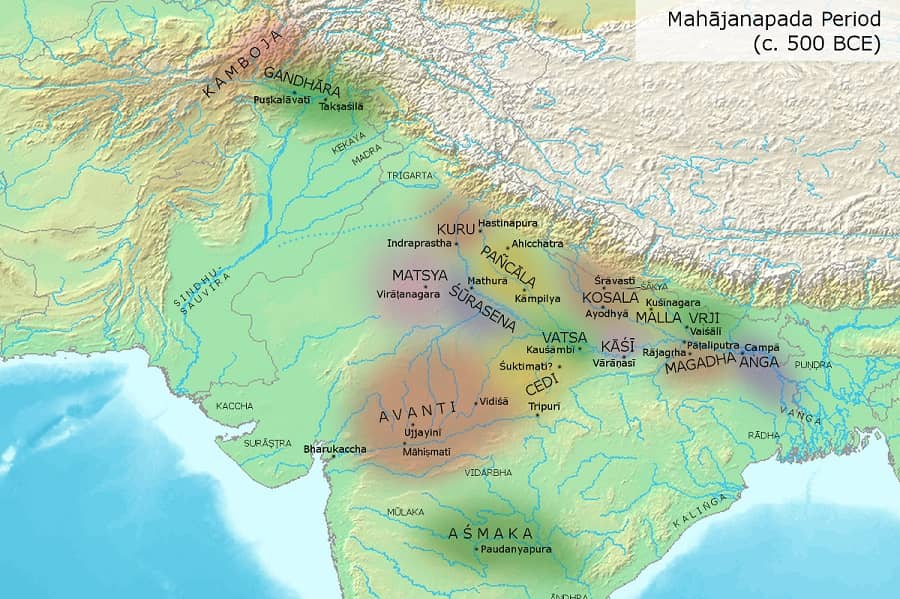March 7, 2019
16 Mahajanapadas
Contents
16 Mahajanapadas and their capitals taxila university gandhara kamboja

>>>>>>
The 16 mahajanapadas of that period as listed in Buddhist Pali Canon were
>>>>>>
Anga
Capital: Champa
Modern location: Munger and Bhagalpur, Bihar
- Reference found in the Mahabharata and Atharva Veda
- Bimbisara taken over Anga
>>>>>>
Magadha
Capital: Rajagriha
Modern location: Gaya and Patna
- Magadha was semi-Brahmanical habitation.
- Magadha and Anga was divided by river Champa.
- Later it became a center of Jainism and Buddhist
>>>>>>
Kasi
Capital: Kasi
Modern Location: Banars
- It got its name from rivers Varuna and Asi according to Matsya Purana.
- Dhritarashtra once ruled over Kashi and Anga
>>>>>>
Vatsa
Capital: Kausambi
Modern Location: Allahabad
- Vatsa is also known as Vamsa
- Ruler Udayana made Buddhism a state religion.
Kosala
Capital: Sravasti
Modern Location: Eastern Uttar Pradesh ( Ayodhya)
- Ayodhya was an important town in Kosala.
- It was merged in the Magadha by the Magadha ruler, Ajatashatru.
- Kosala also included the tribal republican territory of Sakyas of Kapilvastu.
16 Mahajanapadas and their capitals taxila university gandhara kamboja
Saurasena
Capital: Mathura
Modern Location: Western Uttar Pradesh
- This place was a center of Krishna worship at the time of Megasthenes.
- The most famous ruler was Avantiputra.
>>>>>>
Panchala
Capital: Ahichchatra and Kampliya
Modern Location: Western Uttar Pradesh
- Later the nature of governance shifted from monarchy to republic.
- Kanauj was an important town in this kingdom
>>>>>>
Kuru
Capital: Indraprastha
Modern Location: Thaneswar, Meerut and Southeastern Haryana
- The area around Kurukshetra was apparently the site for Kuru Mahajanapada.
- It moved to a republic form of governance.
Matsya
Capital: Viratnagar
Modern Location: Jaipur
- It got its independence from the Chedi kingdom (ruled by King Sahaja) under the leadership of Virat Raja.
>>>>>>
Chedi
Capital: Sotthivati
Modern Location: Yamuna and Narmada belt
- This was cited in the Rigveda
- It located in the present day Bundelkhand region.
>>>>>>
Avanti
Capital: Ujjaini or Mahismati.
Modern Location: Malwa and Madhya Pradesh
- Avanti was significant in relation to the rise of Buddhism.
- It was the most vulnerable of all the mahajanapadas and was ruled by many kingdoms
>>>>>>
Gandhara
Capital: Taxila
Modern Location: Rawalpindi
- Gandhara are cited in the Atharva Veda
- It was significant for international commercial activities.
Kamboja
Capital: Pooncha
Modern Location: Rajori and Hajra
- It is situated in present day Kashmir and Hindukush.
- Several literary sources mention that Kamboja was a republic.
>>>>>>
Ashmaka or Assaka
Capital: Pratisthan/ Paithan
Modern Location: Bank of Godavari
- Brahamdatta was its most important ruler.
>>>>>>
Vajji
Capital: Vaishali
Modern Location: North Bihar
- Vajji was the seat of a united republic of eight smaller kingdoms of which Lichchavis, Janatriks and Videhas were also members.
>>>>>>
Malla
Capital: Kusinara
Modern Location: Deoria and Uttar Pradesh, Gorakhpur region
- Religion was Buddhism
- Malla was a republic
Taxila University
- Taxila University is the oldest university and was probably the first organized educational center of ancient India.
- It is not clear who actually founded this university, although it was funded by almost all the great kingsand rulers of the ancient past.
- It was a center of learning for logic, religion, medicine, mathematics, astrology, the Vedas, warfare and primitive science
- Taxila was the capital of the Gandhara Kingdom, allowed students from all parts of India to be enrolled and education was free for all.
- Only Chandalas were not allowed to study in this university.
- Scholars like Nagarjuna, Panini, Chanakya, Prasanajit, Jeevka (son of Bimbisara) all came to thisplace to study before they became important personalities in Indian history.
- Alexander taken some scholars from Taxila to Greece.
- In BC, the Hun ruler, Toramana, attacked and demolished the university campus.
- During that time, most of the records were burnt or destroyed.
>>>>>

